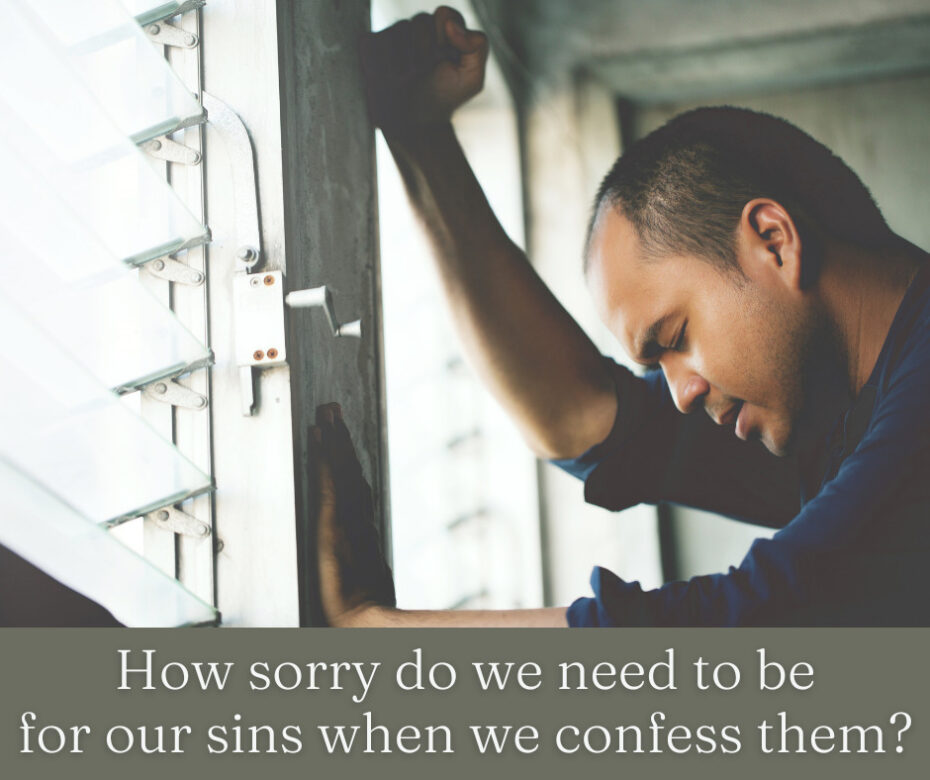This came up in my Sunday school class this past Lord’s Day. I suggested that confessing our sins means acknowledging to God that we sinned when we become aware of it.
But do we need to feel sorry for our sins? If so, how sorry do we need to be? And how do we know we are sorry enough?
It hit me today that I’ve never done a word study on the word translated confess. It is the Greek word homologeō.
It is used twenty-six times in the NT. I studied all of those in preparation for this blog.
It has sins as the object only once, in 1 John 1:9.
In the Scriptural records of the ministry of John the Baptist, a related verb, exhomologeō, is used twice to refer to confessing sins (Matt 3:6; Mark 1:5).
Homologeō will be used at the Great White Throne Judgment when Jesus says, “I will declare to them…” (Matt 7:23).
It is also used in Matt 10:32 and Luke 12:8 to acknowledge, as opposed to denying, Jesus as the Christ. That same sense is found in John 9:22; 12:42; 1 John 2:23; 4:2, 3, 15; 2 John 7; Rev 3:5; and possibly 1 Tim 6:12. (Other uses where the sense is acknowledging include Acts 23:8; 24:14; Heb 11:13.)
Matthew 14:7 uses it in reference to Herod making a promise.
In John 1:20 it refers to John the Baptist’s declaring or testifying, “I am not the Christ.”
It is translated had sworn (KJV, NKJV) or declared (NET) in Acts 7:17.
In Rom 10:9-10, Hodges suggests that homologeō has the sense of calling on His name (Romans, p. 299).
Most translations render it as profess in Titus 1:16.
It is even rendered as giving thanks in Heb 13:15 (NKJV and NASB; NET and ESV have acknowledge; NIV has profess; several have confess).
So what does homologeō mean in 1 John 1:9? These English words would fit: acknowledge, admit, or declare.
When we confess our sins, we are acknowledging them. The opposite of confessing our sins would be denying them (1 John 1:10).
We are on a slippery slope when we suggest that confession involves sorrow for our sins. First, the word homologeō has nothing to do with being sorry. Second, being sorry is a subjective experience that varies greatly. We can be mildly sorry, moderately sorry, or deeply sorry. It is not possible to quantify our sorrow. Third, God asks us to acknowledge our sins, not be sorry for them.
Having said that, 1 John 1:9 is not a magic formula. Acknowledging our sins is only effective if we walk in the light (1 John 1:7). The believer in fellowship with God is walking in the light. Such a person needs to acknowledge his sins as he becomes aware of them in order to remain in fellowship with God. But the believer out of fellowship–the one in the spiritual far country–must repent of his sins (Luke 15:11-32) in order to get back into fellowship.
In his commentary on 1-3 John, Hodges has this helpful statement:
It should be noted that the word repentance is not used here, nor anywhere in the epistle. The reason for this is simple. In John’s usage, Christian repentance is appropriate when a pattern of sin is persisted in and needs to be changed (see Revelation 2:5, 16, 21, 22; 3:3, 19). In our text, John is talking about those who discover sin while in fellowship with God, not those who have wandered away from Him or have lost some previous spiritual attainment. That is a separate issue. The audience of First John is spiritually stable and has nothing to repent of (see 2:12-14, 21). Their task is to “abide,” or “stay,” in Christ and His truth (see 2:24, 28), not to “turn back” to Him (p. 63).
While it is true that as we walk in the light there is certainly some level of sorrow over our sins, it is walking in the light that produces the sorrow, not the act of acknowledging our sins.
I remember Zane Hodges saying that the heart of confessing our sins is being honest with God. That captures the idea well.
I urge you to take the time to study all twenty-six NT uses of homologeō. It is a fun study.


